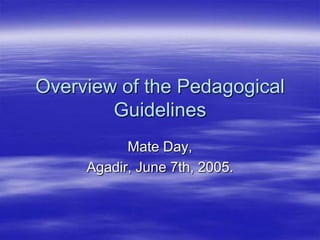
Overview of the pedagogical guidelines
- 1. Overview of the Pedagogical Guidelines Mate Day, Agadir, June 7th, 2005.
- 2. Outline Theoretical framework Teaching practices: Language components and skills Classroom management Project work Assessment Bibliography
- 3. I. Standards Definition: « specify what students should know and be able to do (content), what they might be asked to do to give evidence of standards (performance), and how well they must perform (proficiency). “
- 4. Standards Rationale: - »as rigorous goals for teaching and learning » - «ensure that our schools offer students the opportunity to acquire the knowledge and skills necessary for success.”
- 5. Standards vs Curriculum? Standards define « broad perspectives » Curriculum: lessons, materials, techniques; i.e. « details of the day-to-day schooling »
- 6. Applications of standards through the curriculum Ability to think Skill in communication Production of quality work Connections with the community
- 7. Standards: Background Research in ESL: « Standards for Foreign Language Learning: Preparing for the 21st Century” (general outline) Moroccan educators (performance standards to support each content standard)
- 8. Standards: Key notions Communication Cultures Connections Comparisons Communities
- 9. Standards: samples Interpersonal:Conversation -Content Standard: Students will understand and interpret a language other than their own in its written and spoken form on a variety of topics. -Rationale: Students should develop strong listening and reading skills to interpret the concepts, ideas, and opinions expressed by members of other cultures through their media and their literatures. This standard focuses on increasing the level of understanding as students listen to, read, or view materials in a new language
- 10. Standards: samples (2) Culture practices: -Content Standard:Students will demonstrate an understanding of the relationship between the practices and perspectives of the cultures studied. -Rationale: To fully understand another culture, students need to develop an awareness of another people‟s way of life, of the patterns of behaviour that order their world, and of the traditional ideas, attitudes, and perspectives that guide their behaviours.
- 11. Syllabus for Level 2 Listening Speaking Reading Writing Themes and topics Functions Structural content
- 12. II. Skills: a. Reading Rationale: as a „skill in its own right‟; as life requirement; in relation to writing; as exam requirement
- 13. Reading: Competencies Macro-competencies (global):determining the organization of a text, recognizing the function of a text, undertaking project work related to the theme of a text, . . . Micro-competencies (sub-competencies): scanning, skimming, inferencing, evaluating information, . . .
- 14. Teaching reading: steps Pre-reading: previewing title, semantic mapping, picture stimulus, . . . While-reading: identifying text organization/ function, „word-attack‟ skills, . . . Post-reading: oral/written follow- up, summary, debate, project work, . . .
- 15. II. Skills: b. listening The teaching context Interrelated with speaking Aims and competencies: communicative, cultural, strategic, methodological
- 16. Teaching listening As a complex skill Types of activities Outcomes Requirements
- 17. Methodology: suggested procedure 1. Preparation 2. Presentation 3. Listening 4. Checking 5. Re-listening 6. Follow-up
- 18. II. Skills: c. speaking Rationale: ”Success (in language learning ) is measured in terms of the ability to carry out a conversation in the (target) language “ Nunan 1991 .
- 19. Types of tasks Prononciation exercises; Dialogues : dialogue completion, jumbled exchanges, dialogue recital / rehearsal, Responding to teacher questions / comprehension q. Role-plays : situational cues, functional cues, free role play; role cards, Songs / poems recital, . . .
- 20. Procedure 1. Prepare 2. Present 3. Practice 4. Evaluate 5. Expand
- 21. II. Skills: d. writing Rationale: producing pieces of written discourse Competencies: generating , organizing ideas; planning; exploring materials (magazines, . . .) ; . . . Discourse forms: Journals, e- mails, letters, anecdotes, . . .
- 22. Main Stages Pre-writing Writing Follow-up
- 23. Grammar Rationale: descriptive vs generative grammar; usage vs use, Objectives: generate instances of correct usage, manifest knowledge of the language system, . . .
- 24. Approach Combination of inductive and deductive Competency-based approach (ref. charter)
- 25. Competency-based approach Definition: « In ESL a competency is a task-oriented goal written in terms of behavioural objectives… It is not what the students know about language, but what they do with the language.” (Nunan 1988 : 34)
- 26. Bissonnette and Richard‟s model Level one: skill/‟what to do‟ level: enables the learner to reproduce and explain the content (e.g a grammatical rule) in his own words. Level two: capability/‟when and how level‟: the learner should be able to determine when why or how to use the material. Level three: : Competency/ “mastery” level. This level is characterized by the successful, frequent and automatic use of the material, be it a structure or whatever.
- 27. Steps Specify objectives in behavioral terms Skill level: presentation/comprehension check Capability level: practice/production Competency level: use/application Evaluation: checkist criteria: automaticity, authenticity, contextualization, skills integration
- 28. Functions Rationale: CBI „learners should be able to use the target language in their actual and foreseeable social, vocational and academic situations‟ Types: greeting, asking for permission, expressing ability, possibility, . . .
- 29. Methodology 1. Preparation 2. Presentation 3. Receptive practice 4. Productive practice 5. Recycling
- 30. Classroom management Definition: „Classroom management refers to the ways in which student behaviour, movement, and interaction during a lesson are organized by the teacher to enable teaching to take place more effectively. Classroom management covers a wide range of areas including managing pair and group work, handling transitions, giving instructions, and dealing with disruptive behaviour.‟
- 31. Classroom Management Managing pair work Managing group work Teacher and learner roles
- 32. Project work Definition Major benefits Projects presentation Project work topics
- 33. Continuous Assessment Aims Rationale Test specifications
- 34. Bibliography Testing Learning theory Language teaching methods